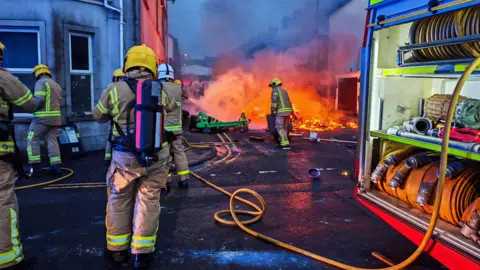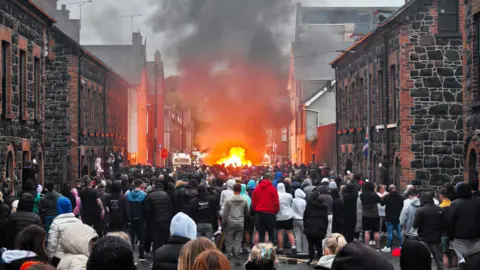BBC News NI
 Pacemaker
PacemakerPolice have said 15 officers were injured in what they have described as “racially-motivated hate attacks” in Ballymena on Monday night.
Disorder started following an earlier peaceful protest over an alleged sexual assault in the County Antrim town.
Alliance assembly member Sian Mulholland said a family with three young children had to “barricade themselves into their attic”.
A 29-year-old man was arrested on suspicion of riotous and disorderly behaviour, attempted criminal damage and resisting police.
North Antrim MP Jim Allister said the violence was “very distressing”.
The Traditional Unionist Voice leader said the “context” for the demonstration was that there had been “significant demographic change in the area” because of “unfettered immigration”.
Earlier on Monday, two teenage boys appeared before Coleraine Magistrates’ Court accused of sexually assaulting a teenage girl in Ballymena.
They spoke through an interpreter in Romanian to confirm their names and ages.
Their solicitor said they would be denying the charges.
What happened in Ballymena on Monday?
Hundreds of people took part in a peaceful march hours after the court appearance.
The crowd of men, women and children gathered close to the town centre and walked along Larne Street and then Queen Street.
Later in the day, violence broke out.
Police said it began when a number of masked individuals broke away from the peaceful protest and began to build barricades and attack properties on Clonavon Terrace.
Over several hours people wearing masks threw petrol bombs, bricks and fireworks at police and two PSNI vehicles were damaged.
Police say they fired one baton round, which hit a rioter.
Six homes in total were attacked, with four of them damaged by fire and three people evacuated.
A number of businesses were damaged with windows and doors smashed.
Some of the injured police officers required hospital treatment.
Family ‘barricaded in attic’
Alliance Party assembly member Sian Mulholland told MLAs she had been in telephone contact with a family with three young children who hid in their house.
She said they feared “they were going to be attacked, as they heard people rampage in the downstairs”.
Speaking in the Northern Ireland Assembly, Mulholland said: “It is only by the grace of God, and by the actions of the PSNI and the Fire Service last night, that we are not looking at something more serious.”
Democratic Unionist Party (DUP) MLA for North Antrim Paul Frew has condemned those responsible for violent scenes and called for calm.
Frew said his thoughts are with “the victim of the sexual assault with whom the community gathered to stand in solidarity”.
He added “that powerful message must not be lost or diluted by those who choose destruction over justice. I feared this would happen. For weeks and months, I have been warning about rising tensions, and sadly those warnings have now come true.”
He said: “There is no justification for what happened. Violence is always wrong.”
Jim Allister’s comments about Monday night’s disorder were condemned by the SDLP’s Matthew O’Toole.
He accused the TUV leader of “conflating a whole range of issues in a way that is deeply irresponsible and deeply unhelpful”.
He said politicians have a “responsibility to use our office and our platform wisely, to give leadership to people who want leadership, not to simply use an appalling act of violence against a young woman to inflame tensions”.
Sinn Féin’s Philip McGuigan, an assembly member for North Antrim, described the violence in Ballymena as “disgraceful”.
Speaking at Stormont, he appealed for calm and urged political leaders to “use measured language and avoid stoking tensions”.
Referencing the protests over an alleged sexual assault in the town, he said police must be allowed to “conduct their investigations thoroughly and for the courts to do their job”.
He added that the “thugs who set out to cause havoc and misery last night must be brought to justice”.
‘Unacceptable and feral’
The Police Federation for Northern Ireland said the “vicious” attacks on officers were “totally mindless, unacceptable and feral”.
The federation chair Liam Kelly said: “I have no doubt whatsoever that police officers – far too few because the service is starved of resources and officer numbers – prevented a pogrom with consequences too painful to contemplate.
“I wish to commend the men and women of the PSNI who undoubtedly saved lives last night.”
Cullybackey arson attack
Police are also investigating a report of arson in Tobar Park in Cullybackey in the early hours of Tuesday.
Shortly after 00:20 BST, the PSNI said a petrol bomb had been thrown at a vehicle which caused it to set alight.
Damage was caused to a nearby property, with a woman and two children inside.
There were no reports of any injuries and it is also being dealt with as a racially-motivated hate crime.
 Pacemaker
PacemakerJustice Minister Naomi Long said she was “absolutely appalled by the disturbing scenes”.
“There is absolutely no place in our society for such disorder and there can be no justification for it,” she said.
In a statement the PSNI said it “strongly condemns” the violence, which was “clearly racially motivated and targeted at our minority ethnic community and police”.
Assistant Chief Constable Ryan Henderson said: “We are engaging with groups affected by the disorder to support and reassure them.”
He added there would be a “significant” policing presence in the town in the coming days.
“I would strongly urge anyone who was involved in yesterday’s violent disorder to reflect long and hard about their actions, they will have consequences. I also appeal for calm.”
International migration in Northern Ireland
According to Northern Ireland Assembly research published earlier this year, about 293,000 long-term international migrants arrived in Northern Ireland between 2001 and 2023.
During that same time period 231,000 left, meaning there was a total net international migration of 62,000 people in just over two decades.
Poland, Ireland and Romania are the countries from which the highest number of migrants have come to Northern Ireland.
If we look at ethnicity, about 3.5% of the population in Northern Ireland are from an ethnic minority.
That compares to over 18% in England and Wales and about 13% in Scotland.
In the Mid and East Antrim council area, which includes Ballymena, the 2021 census said the area’s population was just under 139,000 people.
According to the assembly research, the net number of international migrants who have moved into the area between 2001 and 2022 was 4,900.



